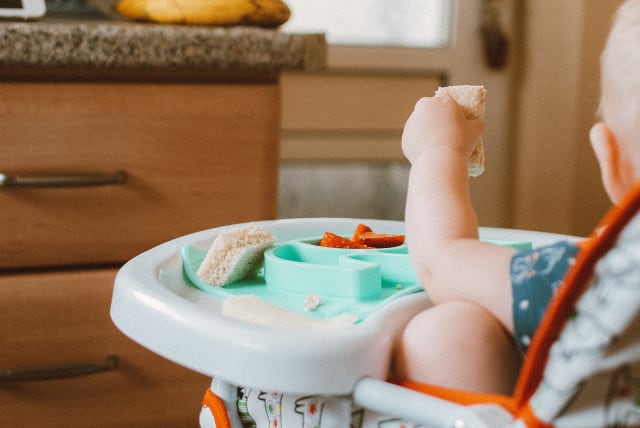Too many parents aren't giving their kids iron supplements

The first months of raising a baby aren't easy and many parents are overtired and might miss some important issues, one of which is ensuring that the baby has enough iron for optimal development.
Most new parents don't know that a baby is born with iron reserves that are only sufficient for about the first four months of life. Afterward, babies need to receive enough iron from breast milk, formula or an iron supplement.
This lack of knowledge often means that babies aren't receiving enough iron which can be dangerous.
Babies that aren't premature and are born at a normal weight have accumulated iron from the mother during pregnancy, which should be enough for growth and development until around four months of age. After that, they start to use the iron stores that exist in the body.
If there isn't enough stored babies can develop anemia. Dr. Yuval Kahane, a specialist in pediatrics and a developmental physician in baby wellness clinics for Clalit in the center, explains.
Kahane stated that anemia in babies can cause cognitive and motor development delays. In the early stages, symptoms such as decreased appetite, decreased rate of weight gain, restlessness, fatigue, and damage to hearing and sight may occur, and in the later stages, there may be emotional problems, damage to concentration and other irreversible problems.
Hemoglobin and red blood cell levels change throughout a baby's life. Anemia is defined when there's a decrease in the number of red blood cells and hemoglobin levels, depending on the level and baby's age.
Hemoglobin, a protein found in red blood cells, has an important role in binding oxygen inhaled from the lungs and delivering it to all tissues and organs. The transfer of oxygen to the tissues is an important factor in nourishing the tissues so that they can develop and function at their peak.
Also, hemoglobin collects carbon dioxide from the tissues, which is transferred to the lungs and breathed out. Carbon dioxide is the waste that's exhaled.
During pregnancy, since there's a low concentration of oxygen in the baby's blood, fetal hemoglobin is formed in relatively large numbers. Fetal hemoglobin binds more easily to oxygen than maternal hemoglobin, ensuring a good oxygen supply for the baby.
After birth with exposure to a higher concentration of oxygen in the air, naturally, there's a decrease in the number of blood cells with fetal hemoglobin. These cells are destroyed and mature hemoglobin is created.
In utero babies receive iron from the mother and a sufficient reserve of iron is created by 16 weeks gestation. Around four months of age, the baby's hemoglobin levels are naturally low because it starts to produce more mature hemoglobin.
So, at this stage the baby's body needs iron to maintain normal hemoglobin values. A deficiency of hemoglobin and red blood cells can indicate anemia which leads to the range of health problems mentioned above.In the first year of life growth, development and reaching milestones is at its peak. So it's important to maintain normal hemoglobin values and sufficient iron intake. Breastfeeding is a good source of iron up to about six months and if the mom is eating healthily.
It's recommended to give an iron supplement to all babies from four months (drops) to strengthen iron stores and prevent anemia with its complications. From four months, a preventative dose of around 1 mg iron per kg is given. Around the age of 6 months and with weight gain, the dose should be adjusted according to weight.
Starting a baby on solids
When babies start solids in addition to breastfeeding or formula at around six months, one should gradually introduce foods rich in iron until the baby is acclimated to a large variety of nutritional components. Foods rich in iron include beef, turkey, legumes: lentils, chickpeas, etc.
Dairy products aren't a good source of iron. At 9-12 months do a blood count to verify the hemoglobin level and adjust the iron dose.
It's important to note that there may be symptoms of hemoglobin deficiency due to a different structure of the cells, against the background of other diseases that aren't related to iron. When anemia doesn't resolve with iron supplements lab tests are needed to try to locate what's causing the anemia.
It might be gluten-celiac sensitivity, sensitivity to G6PD deficiency, a different structure of the red blood cells which causes thalassemia and a genetic component that can cause anemia in a different way. A doctor will recommend treatment.
Kahane says that it is very important to give iron daily since anemia among infants may harm various body functions, so it's important for them to be monitored and treated to prevent future side effects.
Jerusalem Post Store
`; document.getElementById("linkPremium").innerHTML = cont; var divWithLink = document.getElementById("premium-link"); if (divWithLink !== null && divWithLink !== 'undefined') { divWithLink.style.border = "solid 1px #cb0f3e"; divWithLink.style.textAlign = "center"; divWithLink.style.marginBottom = "15px"; divWithLink.style.marginTop = "15px"; divWithLink.style.width = "100%"; divWithLink.style.backgroundColor = "#122952"; divWithLink.style.color = "#ffffff"; divWithLink.style.lineHeight = "1.5"; } } (function (v, i) { });

